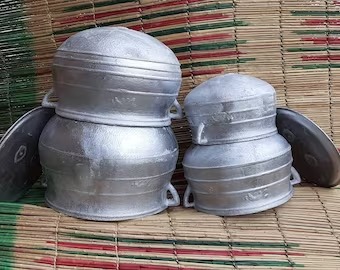A new study on nearly 200 consumer products and food samples across four regions in Ghana has revealed worrying levels of lead contamination in the popular metal cookware, 'dades3n'.
The Global Rapid Market screening study which happens to be the largest of its kind highlights alarming levels of lead in consumer goods and food produced in low and middle-income countries including Ghana with far-reaching global consequences.
The study conducted by the environmental NGO, Pure Earth’s Blacksmith Initiative revealed that there are high levels of lead contamination in the following: Metal cookware (Dades3n) is 55%, ceramic cookware has 18%, toys for kids has 14%, and cosmetics (local mascara) has 7% of lead.
According to a report launched by the World Bank recently, the levels of lead exposure are extremely high which leads to a decrease in IQ.
“Children under 5 years old worldwide lost 765 million IQ points, those living in low and middle-income countries lost 729 million IQ points.”
“There is an average loss of 5.9 IQ points per child and this IQ points loss is 80% greater than the previous estimate,” the report stated.
Country Director for Pure Earth, Esmond Wisdom Quansah also reiterated that eating from these metallic cookwares puts individuals at a high risk of lead poisoning.
According to him, the experiment was conducted six times and the results were the same hence the institution wants to create public awareness so that other alternatives may be considered to avoid further damage.

“What this points to is that we are not safe, if you happen to be eating from any of these metallic or ‘dades3n’ cookware we are at risk of lead poisoning.”
“We’ve grown a step further, our scientists have conducted what we call the leach test to determine the percentage of leach of this lead concentration in this metallic or aluminium cooking pot into the food and we were surprised by the findings of the scientists.”
"52% of the pots tested leached lead in concentrations greater than our reference level of 10 ug/L. The repeated leaching “boils” in pots in general resulted in lower lead in leachate, although lead remained above the 10 ug/L reference level in most cases, so that is a cause for concern for everyone and that is why we are putting this information in the public,” he explained.
Latest Stories
-
Livestream: The manifesto debate on WASH and climate change
51 seconds -
Alan Kyerematen saddened by NDC and NPP’s neglect of Krofrom Market in the Ashanti Region
4 mins -
CSIR Executive Director urges farmers to adopt technology for improved farming
18 mins -
Football Impact Africa’s Ghetto Love Initiative inspires change in Teshie
29 mins -
Peter Toobu calls for tighter border security over uncovered weapons at Tema Port
32 mins -
Gov’t has failed its commitment to IPPs – Ablakwa
36 mins -
Sell Chrome to end search monopoly, Google told
47 mins -
KATH to install seven new dialysis machines by end of November
51 mins -
Walewale: Police confiscate 37 bags of cocoa beans suspected of being smuggled out of Ghana
1 hour -
‘Expired’ Rice Scandal: FDA confirms rice was safe for consumption after rigorous lab tests
1 hour -
Many women have experienced intimate partner violence – Angela Dwamena Aboagye
1 hour -
Power challenges persist due to government’s mismanagement of revenues – Okudzeto Ablakwa
2 hours -
Jordan Ayew injury not as bad as feared – Leicester City boss
2 hours -
Stonebwoy heads to North America for UP & RUNNIN6 tour
2 hours -
FDA explains extension of best-before date for ‘expired’ rice
2 hours

